Tech
ATP Cyber HealthTech Conference and Challenge Scheduled for August 2020
Published
5 years agoon

Atlanta Tech Park, the global technology accelerator in Peachtree Corners, will host the inaugural ATP Cyber HealthTech Conference and Challenge on Thursday, August 6, 2020. The event will be live-streamed via vLink Solutions, and it will feature keynotes from Dr. David Putrino and Dr. Mary Catherine George of Mount Sinai Health System in New York City. The goal of the conference is to highlight the disruptions occurring at the intersection of cybersecurity and medical technology. Tickets are $50 through the end of June and can be purchased atatpcyberhealthtech.com now.
While the HealthTech (MedTech) industry was changing before COVID-19, the pandemic accelerated vital disruptions happening within, such as TeleHealth, PPE manufacturing and distribution, sanitation formulas, and more. Data surrounding patient privacy and key information has also taken on greater value. So much so that there is a $10,000 Sertainty SDK developer challenge as part of ATP Cyber HealthTech 2020 as well.
Premier sponsors for #atpcyberhealthtech2020 include Sertainty and InterSystems. The steering committee consists of members representing brands such as Cox, Emory, Hargray, and Kennesaw State University.
Related
Education
GA Tech Launches First-of-its-Kind GT Atrium in Peachtree Corners
Published
1 month agoon
April 27, 2025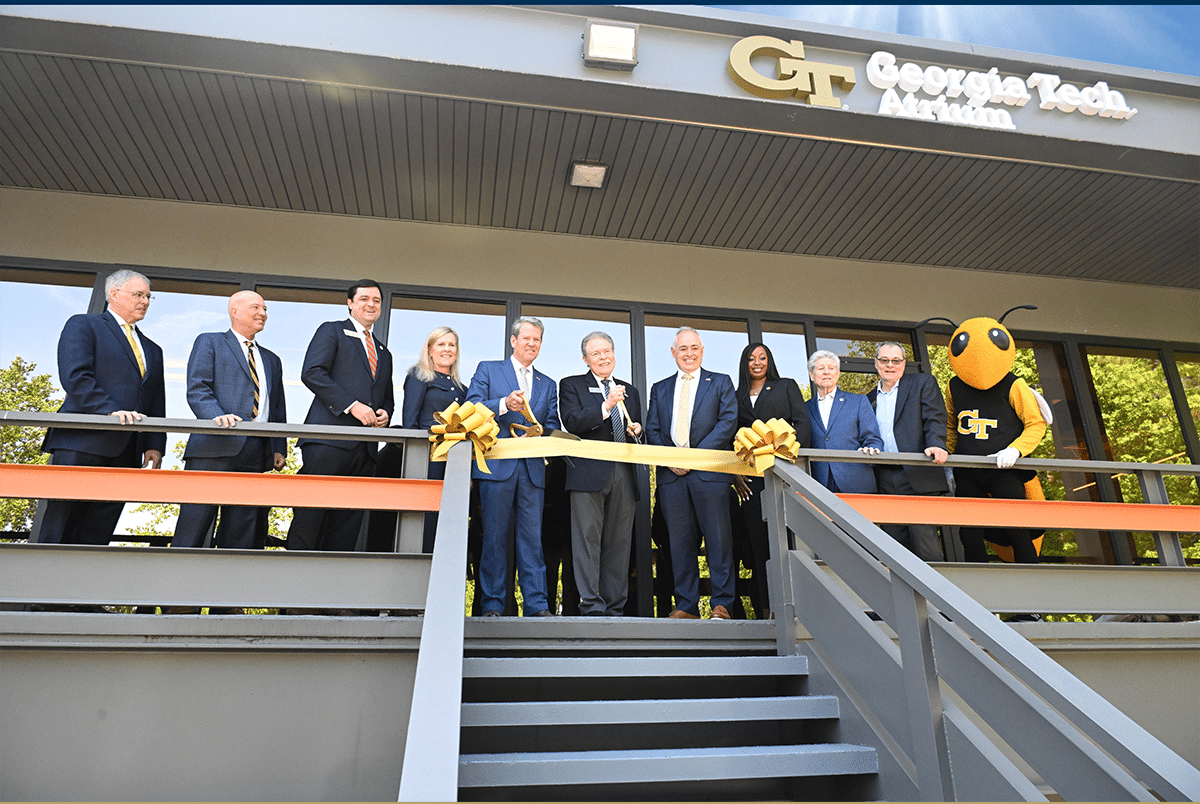
The adage “good things come to those who wait” could be true for Peachtree Corners city officials and administrators at the Georgia Institute of Technology.
After nearly a decade of planning, a vision for the technology-forward municipality and the higher education cultivator of innovation has come to fruition with the new Georgia Tech Atrium at Peachtree Corners’ Curiosity Lab.
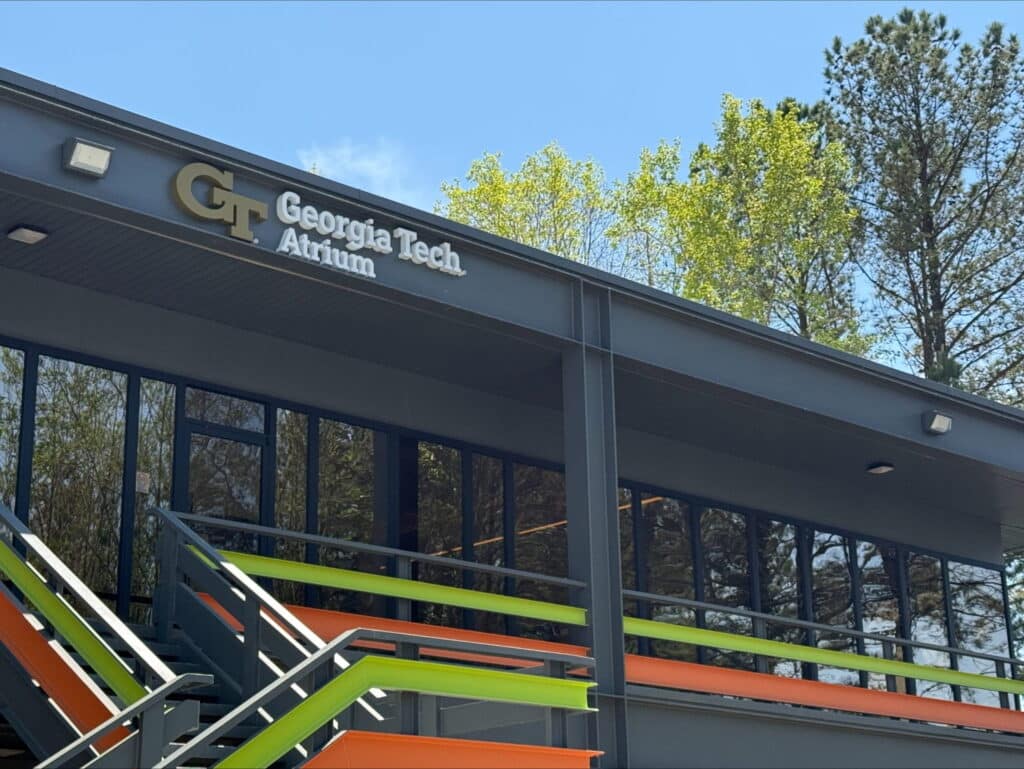
With 200 or so attendees present, Georgia Gov. Brian Kemp, Peachtree Corners Mayor Mike Mason, and Georgia TechPresident Ángel Cabrera cut the ribbon on this first-of-its-kind space.
“I actually came to this exact building with Georgia Tech’s former president in 2016 when we just began to think about what this partnership could be,” said Dene Sheheane, president of the Georgia Tech Alumni Association. “The wheels of higher ed turn slowly, so I’m excited to see it finally come together.”
The opening of the GT Atrium in Peachtree Corners is the first of many planned collaborations to come between the school and municipalities throughout the state and beyond.
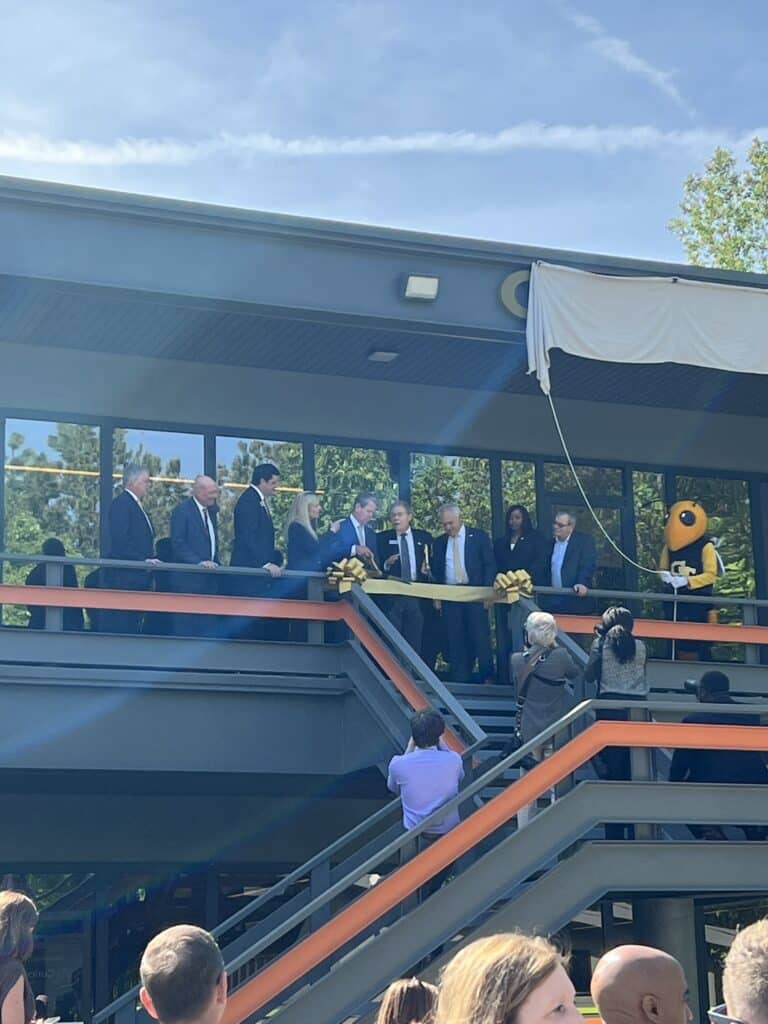
An initiative of the Center for 21st Century Universities at the Georgia Tech College of Lifetime Learning, each GT Atrium will offer a space for the institute’s faculty, staff, students, alumni and partners to advance their academic and professional interests in the country or region that it serves. It will provide tailored programs, event space, a study abroad base, co-working and co-learning spaces, as well as opportunities to engage and associate with Georgia Tech.
What purpose does the project serve?
Nelson Baker, interim dean of the College of Lifetime Learning agreed that Peachtree Corners was the right place to start the Atrium project.
“Support and leadership from cities like yours, that both fuel the growth and give our next generation of technology leaders what they need to lead their projects and to be successful, in many ways, is the ultimate expression of what a university, especially a research university like Georgia Tech, is all about,” he said.
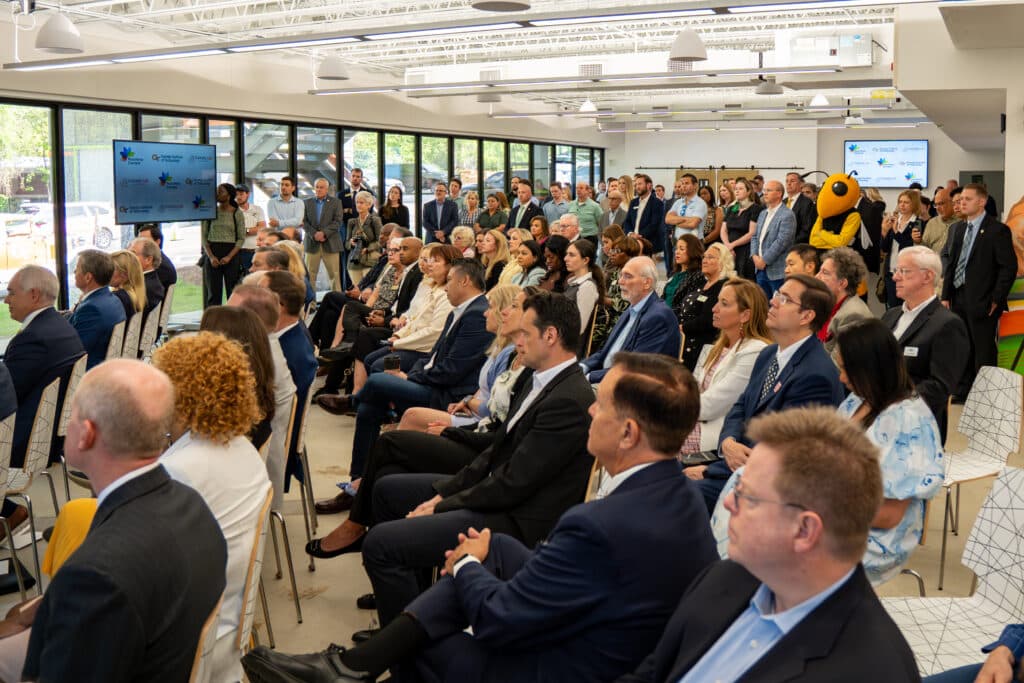
Baker went on to explain why such an endeavor is necessary.
“Today’s world is changing pretty rapidly, and one of the biggest changes is learning itself,” he said. “Today, people are living longer, they’re working longer and they’re changing jobs more often than ever before.”

He added that they face broad, intense career and technological disruptions, and although a degree is a good foundation for many careers, the individual must continue to learn for as many as 50 years past graduation.
“How can a four-year degree last more than half a century in a person’s lifetime? At the same time, geographically dispersed companies and communities across our state need ways for workers to develop, to up-skill and re-skill,” he said. “Our universities and schools — all of our learning systems must adapt.”
Connecting with communities for lifelong learning
Instead of attacking the problem piecemeal, leaders at Georgia Tech sought to address the problem as a “coherent whole.”
“The institute set out to better connect to our communities, to be present, to expand access, amplify our impact and to tie it all together,” said Baker. “That’s how we got here today, with the first new college at Georgia Tech in 35 years and the first Georgia Tech Atrium meant to extend our campus into communities in new ways.”
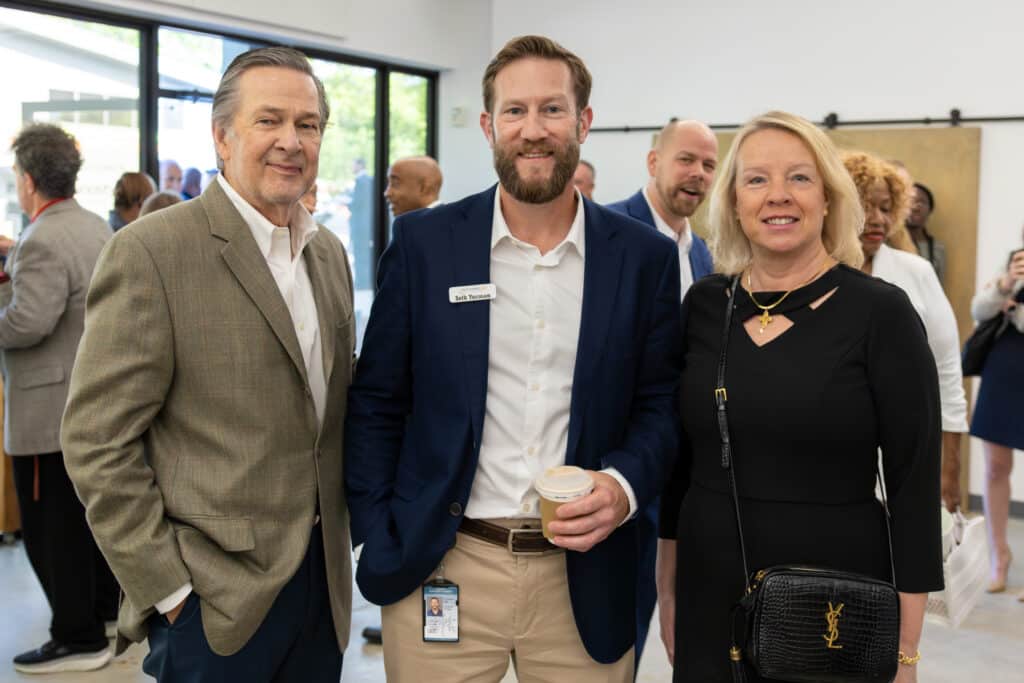
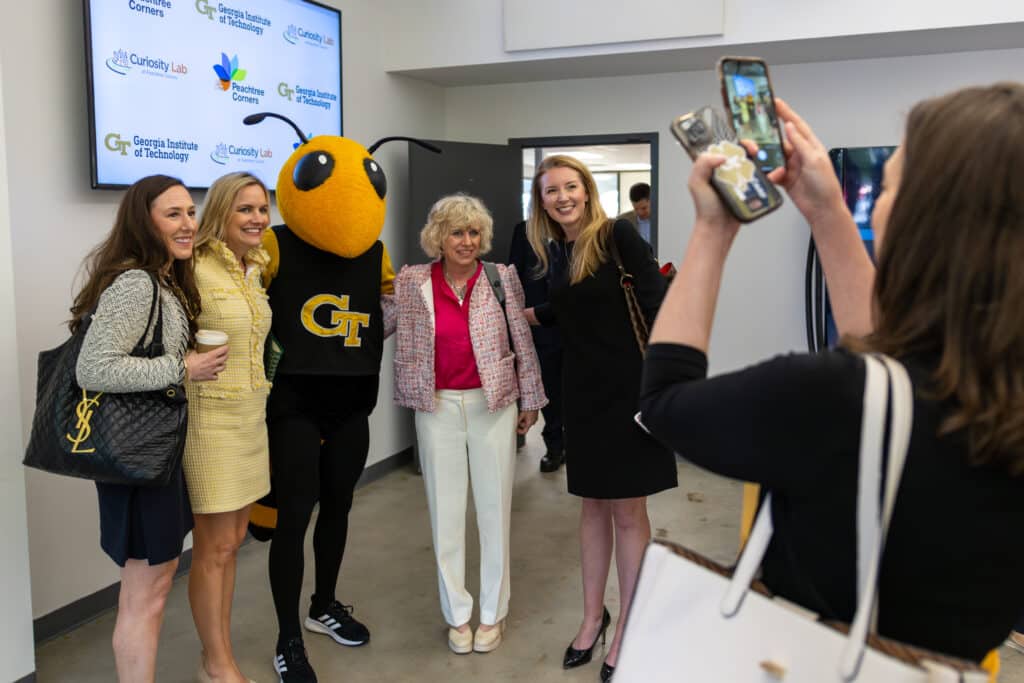
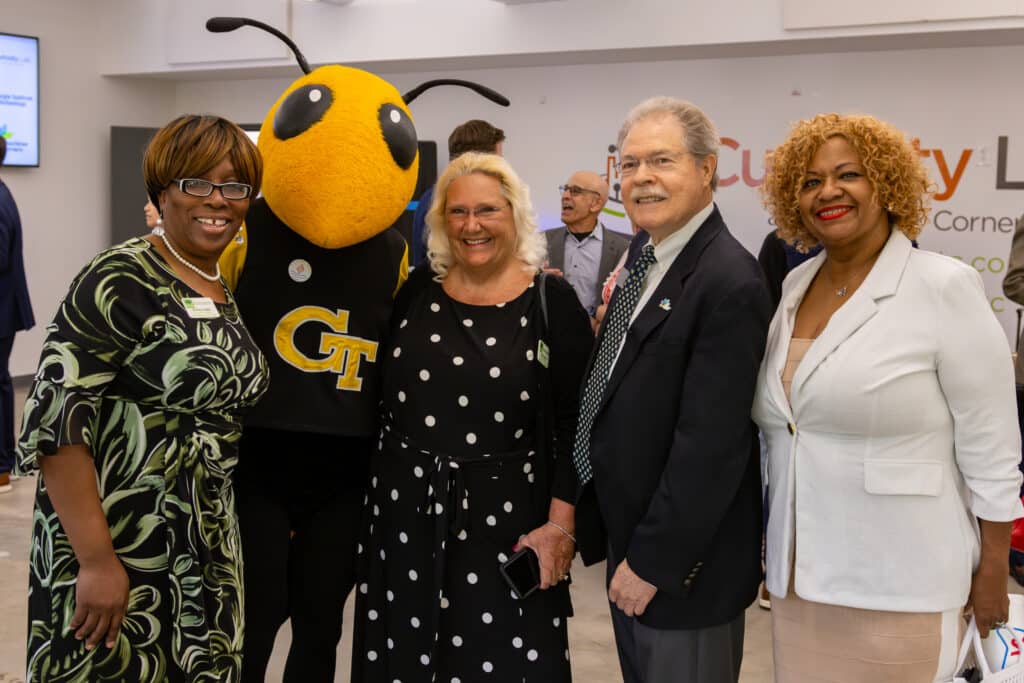
For a century, universities have been focused on research and study, on teaching and on founding colleges of education that improve the discipline of pedagogy and the transfer of knowledge, he added.
“The College of Lifetime Learning brings a new discipline to learning itself, empowering the person through research technology and a lifelong access to enable agency over one’s lives. It’s the other side of the equation — the person side,” he said. “Rather than influencing stages of learning separately, the College of Lifetime Learning comprehensively applies research and technology to empower people. We’re focused on operating through K-12, through research and through professional education. We build on the experiences across all stages of learning and are adding faculty to develop and teach in this new field.”
Empowering learners with access and options
Georgia Tech has also vowed to apply the practical technology and deep research to empower people with access, with options and with community.
“Ultimately, we hope to ensure expanded access to high-quality education so all learners, regardless of their background or the stage of life or career, have the opportunity to succeed, thrive and get ahead,” Baker said. “This will improve our system and carry the disciplines and knowledge across our state and world.”
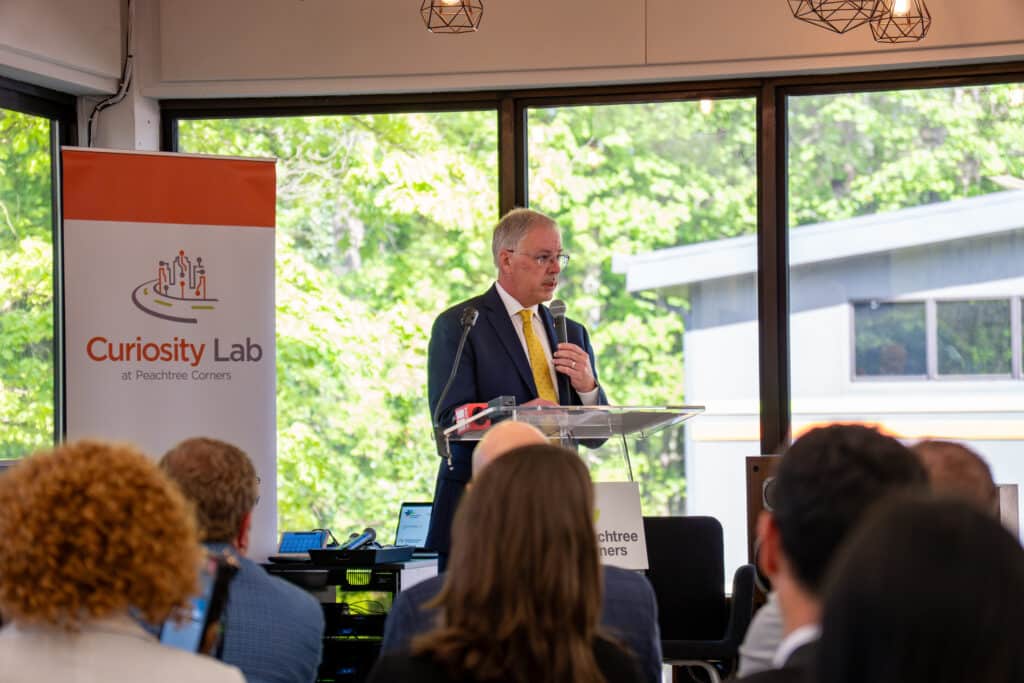
One vehicle to help do that is the GT Atrium — a reinvention of Georgia Tech’s physical presence on a global yet localized scale.
“Think of it as a piece of Georgia Tech, a communal space where we can contribute to the community, even as we serve our own learners and alumni,” he said. “Here we offer networking, upskilling and learning opportunities to communities.”
He reiterated that none of these perceived advancements would be possible without strong community support. The dream that started with Peachtree Corners founder Paul Duke continues.
Goals and growth
Georgia Tech President Cabrera was quick to point out that the institution doesn’t exist just for a few.
“We’re not the Atlanta Institute of Technology or the Buckhead Institute of Technology — we’re the Georgia Institute of Technology,” he said. “Our goal is to amplify impact, the value that we create for the state that we serve.”
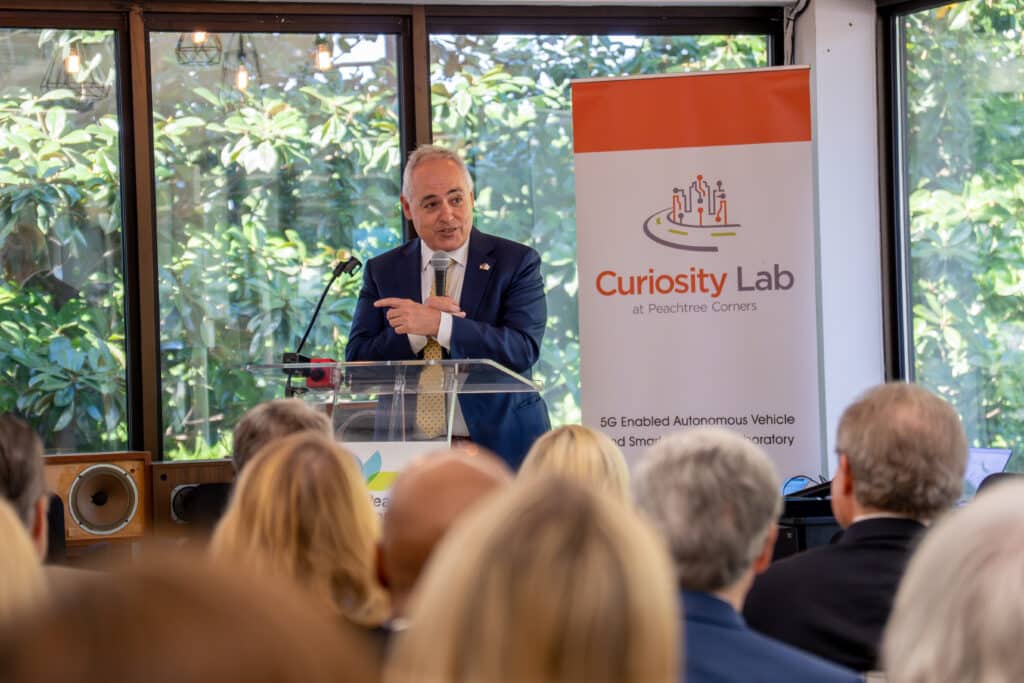
It’s no secret that Georgia Tech attracts — and produces — talent that researches and creates ideas that drive the innovation economy in this state. But it’s not going to rest on those accolades.
“We’re working on some big bets that seem a little overwhelming, but the crazy thing is, we’re delivering on them,” said Cabrera.
One goal is doubling the number of degrees awarded every year.
“We are almost two-thirds towards that goal,” he said. “We’re right now the fastest growing university in the country and … the largest university in the state. We’re the third largest recipient of federal grants for research in the nation.”
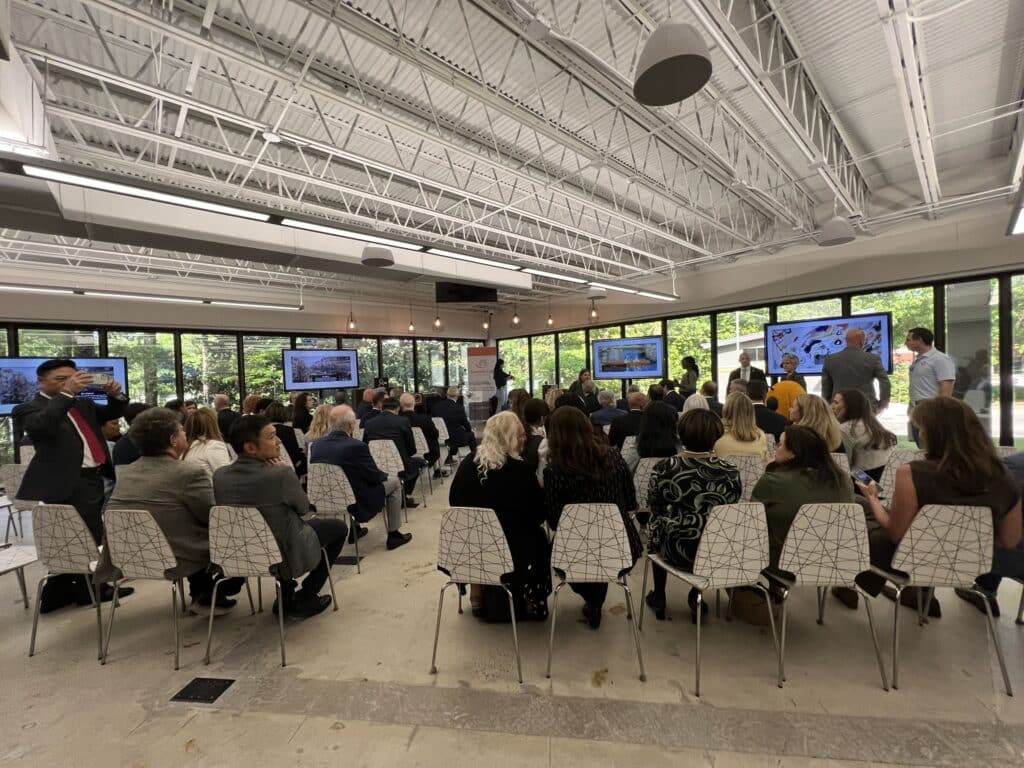
With those rewards, comes a great responsibility, he added.
“That’s a big deal because we all pay into the federal budget with our income tax. It’s only fair that we bring our fair share of those resources back here. And many of the ideas that we produce end up turning into innovation startups that activate the economy of our state,” he said.
A prototype that will work anywhere
Georgia Tech wants to continue to create one of the most thriving, exciting, energizing hubs of entrepreneurship and innovation right here in the Peach State, and that’s why the Atrium is so vital.
“We’re laser focused on these goals, but how do we produce more talent? How do we do more research? How do we support entrepreneurs that can really drive the innovation and knowledge economy?” he asked.
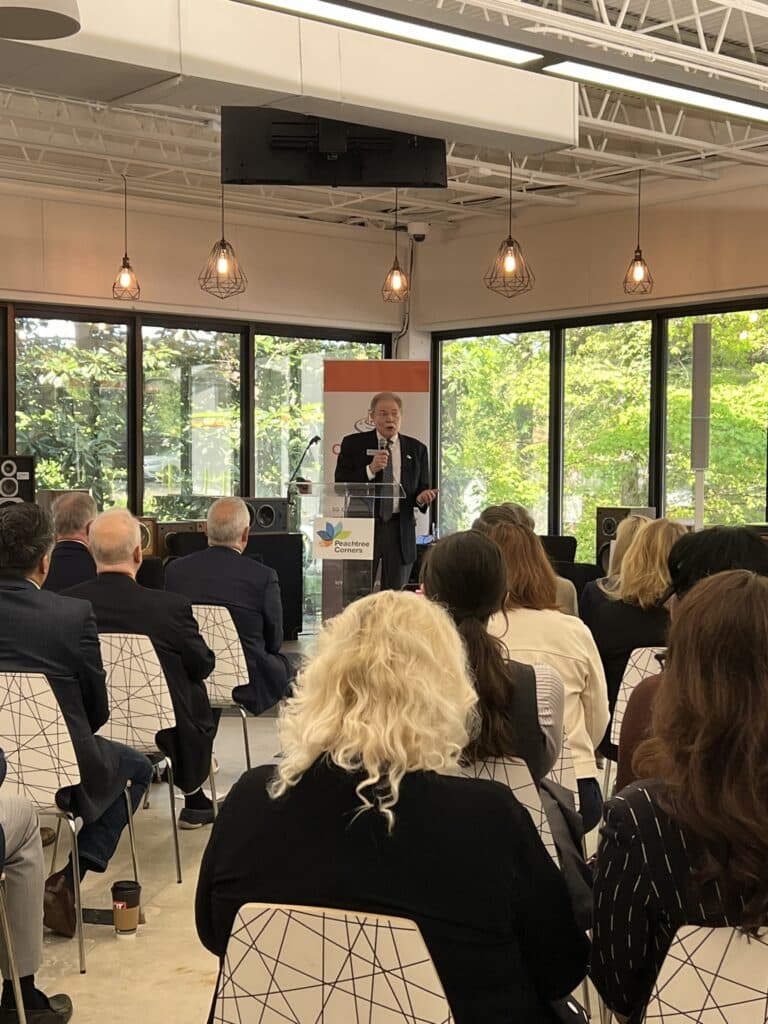
Answering his own rhetorical question, Cabrera announced another goal — Georgia Tech must have an impact on every county in the state.
“What if we developed in key locations across our state?” he asked. “Locations, rooms, spaces, buildings — it doesn’t have to be a big campus, but a space where entrepreneurs can come and receive the support that they need.”
He ended with a sharp gaze sweeping the room.
“This is the first one,” he said. “So to my dear colleagues, don’t screw it up.”
Impact on economic and workforce development
“This pro-business environment that we have is essential to Georgia’s success, and it’s why we’ve been named the number one state in the country for business for 11 consecutive years,” said Gov. Kemp. “But it also means we’re delivering real impact for the people of our state.”
During his time in office, Kemp said the state has announced 193,000 new jobs, and private sector partners have created more than $90 billion of investment.
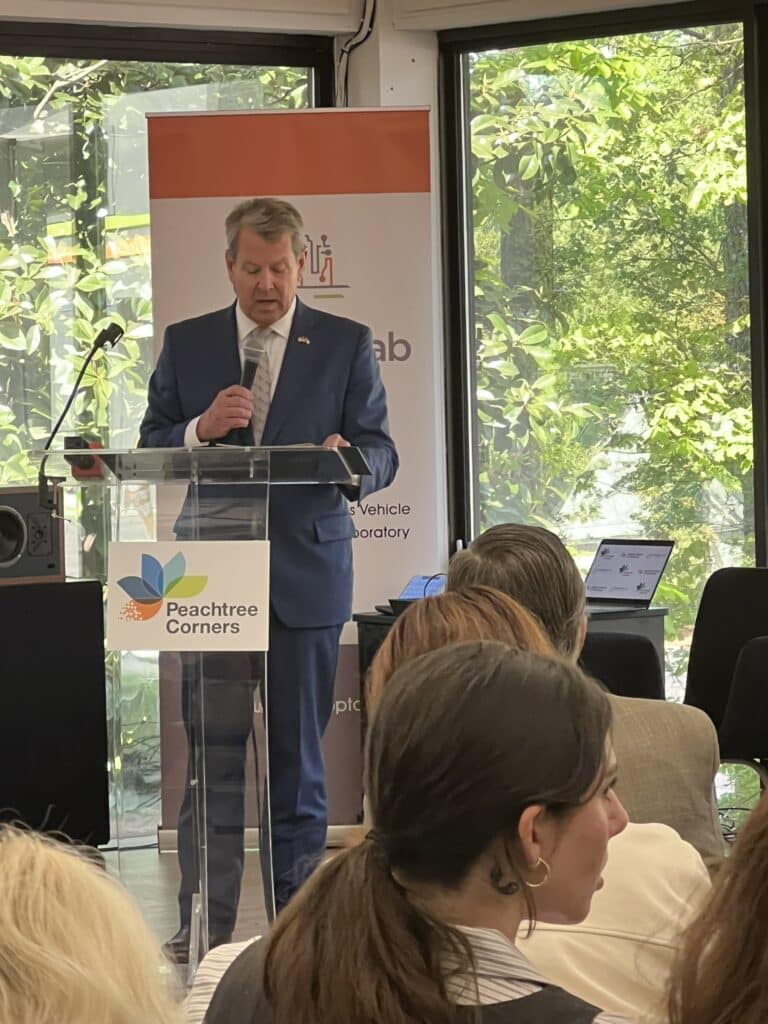
“These projects choose Georgia because they recognize the unique assets that our state can offer, including a talent base that is supported by institutions like Georgia Tech,” he said.
“Workforce development has been, and will continue to be, a top priority in my administration, after business leaders made it apparent that there was a great need for qualified workers to fill really thousands of jobs that are coming to our state, not only today, but many that will be created over the next four or five years.”
State leaders, including those at Georgia Tech, have taken great steps forward in efforts to build that workforce of tomorrow. Kemp referenced the Georgia Match program, the largest direct college admission program in the country.
“I was proud to report last fall that following the launch of Georgia Match, we saw an increase in enrollment of all our higher education institutions, including a 6% increase at USG (University System of Georgia) schools,” he said.
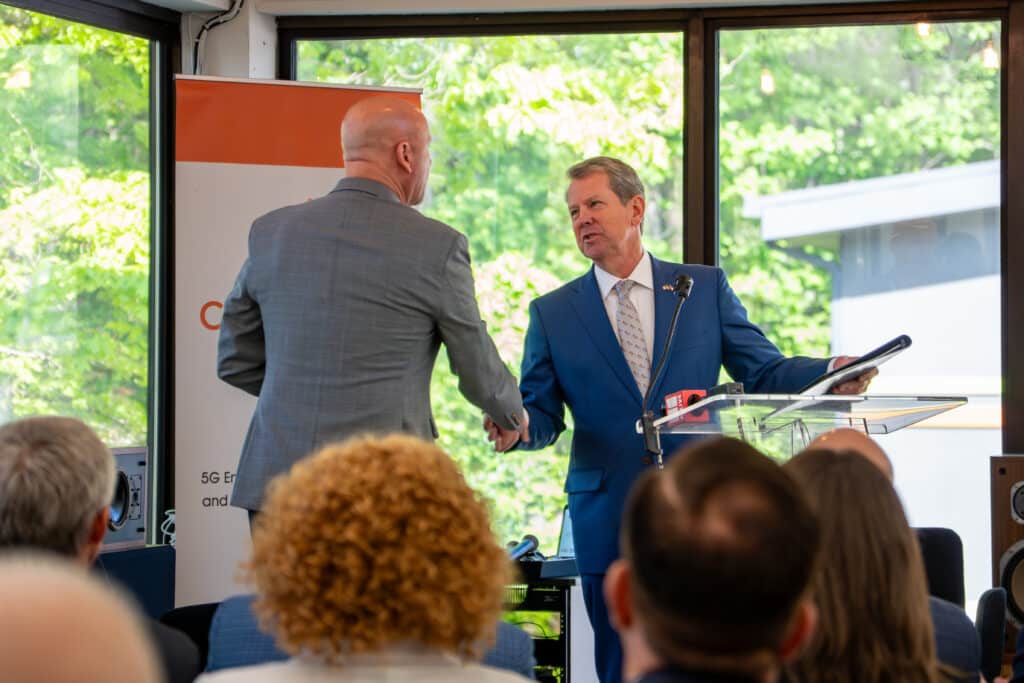
He also mentioned that the state legislature passed the Top State for Talent Act, which, he said, will better align K-12 and higher education curriculum with the needs of businesses in this state.
During the last fiscal year, technology and corporate hubs created at least 4,400 new jobs, including 400 at Cargill’s Atlanta office hub. Other announcements included insurance company AIG opening a new innovation hub in DeKalb County that can accommodate more than 1,000 employees and California-based TriNet announcing a 150,000-square-foot office in Dunwoody creating 750 new jobs.
“The Wall Street Journal recognized Georgia Tech as the second best public college in the nation, and top 10 amongst all higher education institutions,” Gov. Kemp said. “They specifically rated Tech high in the value it added to its graduate salaries in comparison to the cost of attending.”
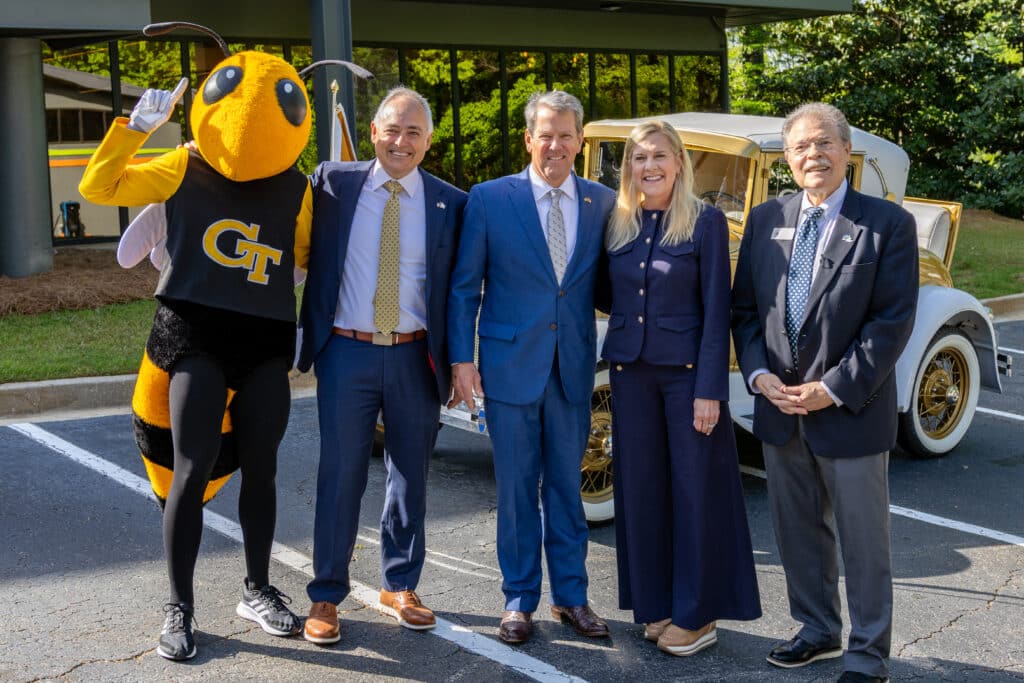
He closed by saying “We’re fortunate to have a team here in Georgia made up of government, business and educational leaders committed to working together to deliver results for our people. I want to again thank everyone here for your work and that mission, and say congratulations again on today’s milestone.”
About the GT Atrium
The Georgia Tech Atrium, developed and overseen by the Center for 21st Century Universities (C21U), the research arm of the College of Lifetime Learning, is a cornerstone for institutional development as delineated in the institute’s Strategic Plan for 2020-2030.
The GT Atrium is based on a multi-year study of the factors influencing higher education and how a modern university should adapt. Insights from this study and additional research conducted since the initiative’s inception have guided its vision and planning.

Hence, it has been designed to enhance the Georgia Tech experience by transcending the boundaries of conventional physical and digital classrooms by fostering learning opportunities that accommodate individuals across all stages of life.
Each Atrium location will be designed to reflect the surrounding culture and community, creating a vibrant environment for exploring new opportunities. GT Atrium promotes partnerships with local and international communities, strengthening collaborative relationships with individuals, government entities, neighborhoods and school systems.
While GT Atrium is best considered a platform for innovation, it currently comprises six core areas. These are:
- Co-learning spaces: Dedicated spaces to bring together Georgia Tech online learners with the broader institute network and expand the services offered to them.
- Advising: Customized services designed to guide stakeholders in the need for upskilling and reskilling as they navigate their evolving professional futures.
- Networking: Facilitate the online connection of the school’s students and alumni with the broader professional network of the Georgia Tech family.
- Lifetime learning: Targeted programs designed to enhance workforce development and positively impact local economies.
- English as a second language (ESL) programs: International (and some domestic) GT Atriums will feature a program run by the Georgia Tech Language Institute, designed to enhance the communication skills of non-native English speakers.
- Georgia Tech connection: A dedicated space for the institute’s faculty, staff and students to participate in events featuring Tech speakers and engage with alumni, local business leaders and other key stakeholders.
To learn more about the GT Atrium program, visit atrium.gatech.edu.
Related
Education
GA Tech, Peachtree Corners Solidify Partnership with First-of-its-Kind Venue
Published
1 month agoon
April 22, 2025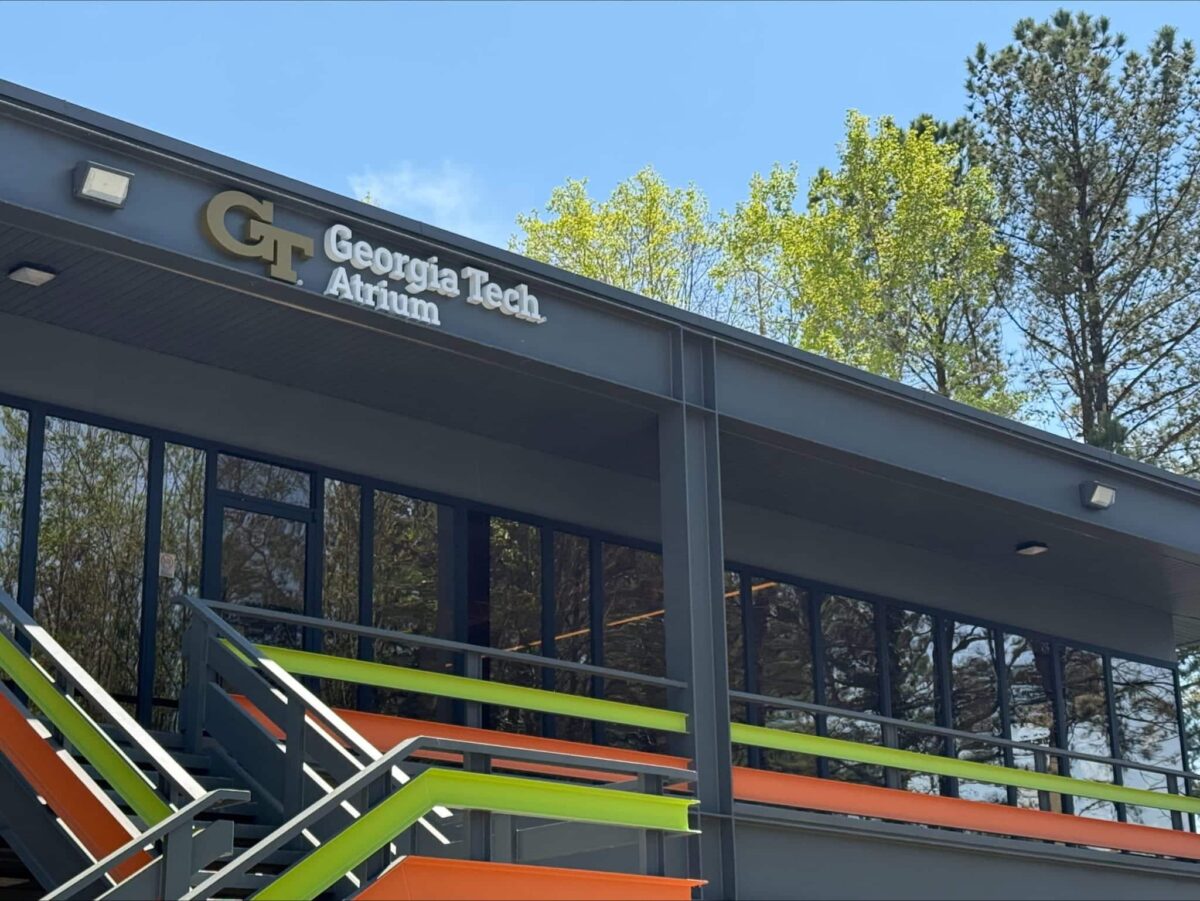
The fortunate 200 or so attendees of the opening of the Georgia Tech Atrium at Curiosity Lab in Peachtree Corners can say they witnessed a significant bit of history. The ceremony highlighted a decade-long partnership between the Georgia Institute of Technology and the city of Peachtree Corners and introduced one of the university’s new global initiatives.

Led by the Center for 21st Century Universities at the Georgia Tech College of Lifetime Learning, each GT Atrium will offer a space for the institute’s faculty, staff, students, alumni and partners to advance their academic and professional interests in the country or region that it serves.
Designed to foster hands-on student research, industry collaboration and technology breakthroughs, they will provide tailored programs, event space, a study abroad base, co-working and co-learning spaces and opportunities to engage and associate with Georgia Tech.
The opening of the GT Atrium in Peachtree Corners is the first of many planned collaborations to come between the school and municipalities throughout the state.
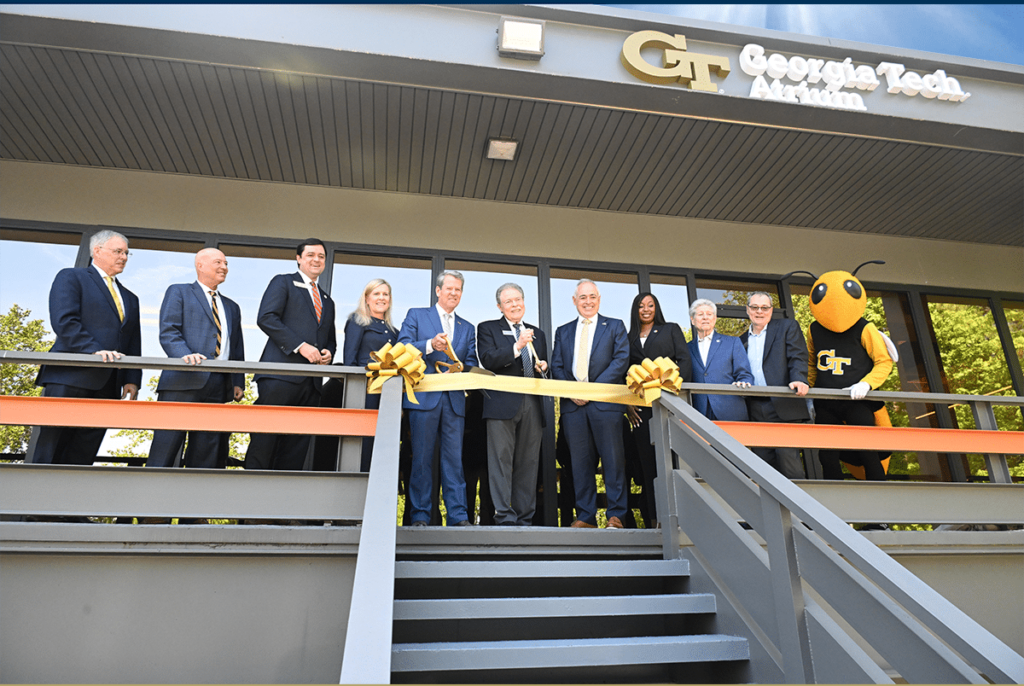
“The Georgia Tech Atrium at Curiosity Lab represents the future of higher education — where learning extends beyond the classroom and where broad community collaboration creates novel opportunities and advances,” said Georgia Tech President Ángel Cabrera.
“This initiative proceeds from a concerted strategy to extend Georgia Tech’s reach, expand access to our resources and expertise and build connections that benefit students and advance research. We’re proud to partner with the City of Peachtree Corners to bring this vision to life.”
Key points
Key points of the event included the Atrium’s role in fostering innovation, upskilling and community engagement. Through this and other initiatives, Georgia Tech aims to double its degree awards and enhance its research impact.
The atrium will offer professional education, K-12 programs and networking opportunities.
The project aligns with the state’s economic development goals, having created 193,000 jobs and $90 billion in investments since 2019.
The event concluded with a ribbon-cutting ceremony, emphasizing the significance of the Atrium in Georgia’s innovation ecosystem.
A collaborative project
With Gov. Brian Kemp, his wife Marty Kemp, Peachtree Corners Mayor Mike Mason, Ga Tech President Ángel Cabrera, Georgia state Rep. Scott Hilton-R, Peachtree Corners and many other politicians and dignitaries present, Gov. Kemp made a point of thanking local Georgia Department of Economic Development board member Jose Perez for his hand in bringing the project together.
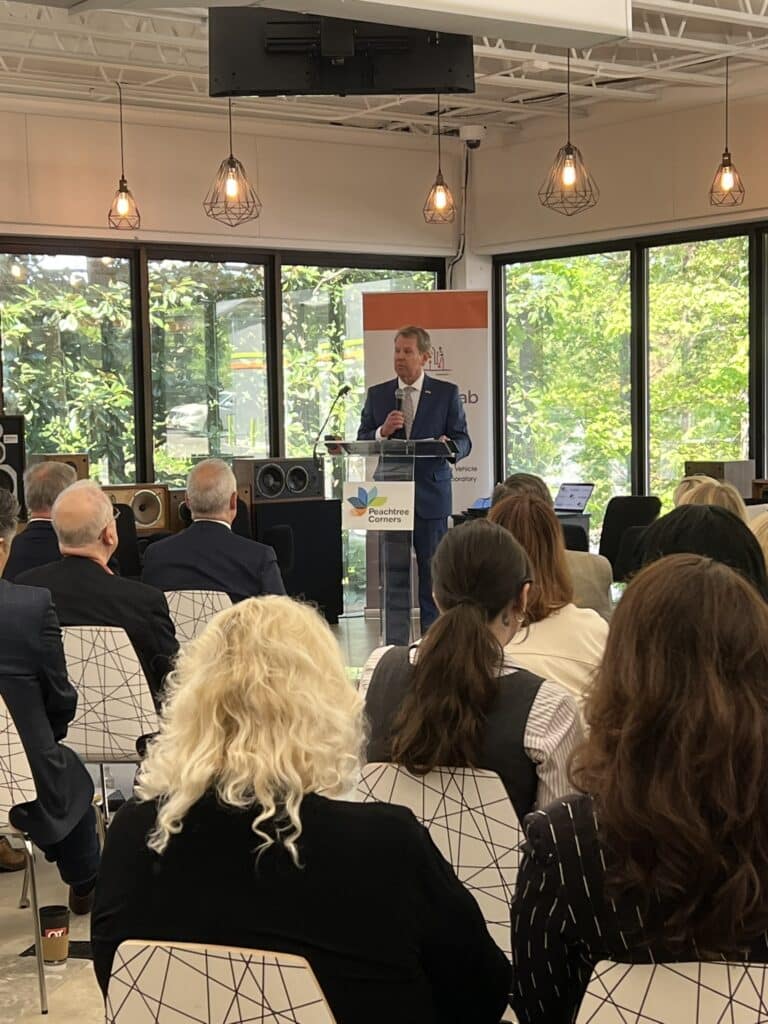
“And I just want to thank Jose Perez — you’re a great champion,” he said. “We appreciate your leadership and your friendship. You know this pro-business environment that we have is essential to Georgia’s success, and it’s why we’ve been named the number one state in the country for business for 11 consecutive years.”
A resident of Peachtree Corners, Perez is the retired President of Target Market Trends, Inc. (TMT), a consulting firm he founded in 2002 to help clients develop market strategies. He also spent 25 years at BellSouth in various management roles and worked as an international consultant with Gartner, Inc.
From 2004 to 2011, he served on the Board of Education and held leadership positions with the National Association of State Boards of Education and the State Charter School Commission.










About Georgia Tech
The Georgia Institute of Technology, or Georgia Tech, is one of the top public research universities in the U.S., developing leaders who advance technology and improve the human condition.
The institute offers business, computing, design, engineering, liberal arts and sciences degrees, as well as professional development and K-12 programs for fostering success at every stage of life.
Its more than 53,000 undergraduate and graduate students represent 54 U.S. states and territories and more than 143 countries. They study at the main campus in Atlanta, at instructional sites around the world and through distance and online learning.
As a leading technological university, Georgia Tech is an engine of economic development for Georgia, the Southeast and the nation, conducting more than $1 billion in research annually for government, industry and society.
For more about the GT Atrium at Peachtree Corners, visit atrium.gatech.edu/peachtree-corners.
Gallery photos of the event courtesy of Curiosity Lab
Related
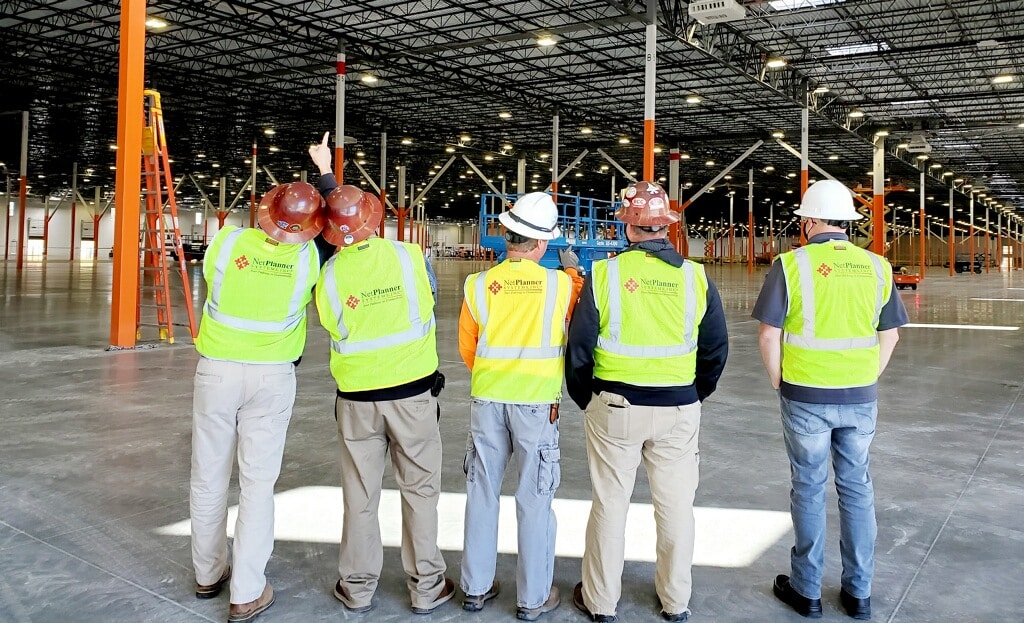
How NetPlanner Systems powers businesses with tech-forward services and solutions
Anyone who’s been in business for more than a decade — maybe even less than that — can attest to the changes one must make to stay relevant. Such is the case with NetPlanner Systems.
During a discussion recently with Southwest Gwinnett magazine, CEO Clint Bridges explained that NetPlanner was an outgrowth of another company he started in 1983, initially in Mableton and later moved to the Peachtree Corners/Norcross area in 1985.

The first company manufactured printer and modem cables, which were in high demand during the early personal computer market boom. The company transitioned from manufacturing to providing networking services in 1987 due to the shift in the market and the desire to stay in a service-oriented business.
“Those cable assemblies sold for higher margins in the early days of the PC market. Rapidly, a lot of that manufacturing went offshore, and the margins went down, and a number of my competitors decided just to become brokers in that field,” said Bridges. “I didn’t really want to become a broker. I am very technical, very hands on, and so I sold that first business in 1986.”
Services and market reach
The contacts and trust he’d built with customers prompted him to go another route.
“Local area networking was starting to come into the marketplace, and so instead of manufacturing cable assemblies, we started to do networking, which involves putting network cabling and related hardware into commercial buildings,” he said.
NetPlanner built some of the earliest networks in the area.
“This was back in the days before there were any standards for this,” Bridges added.
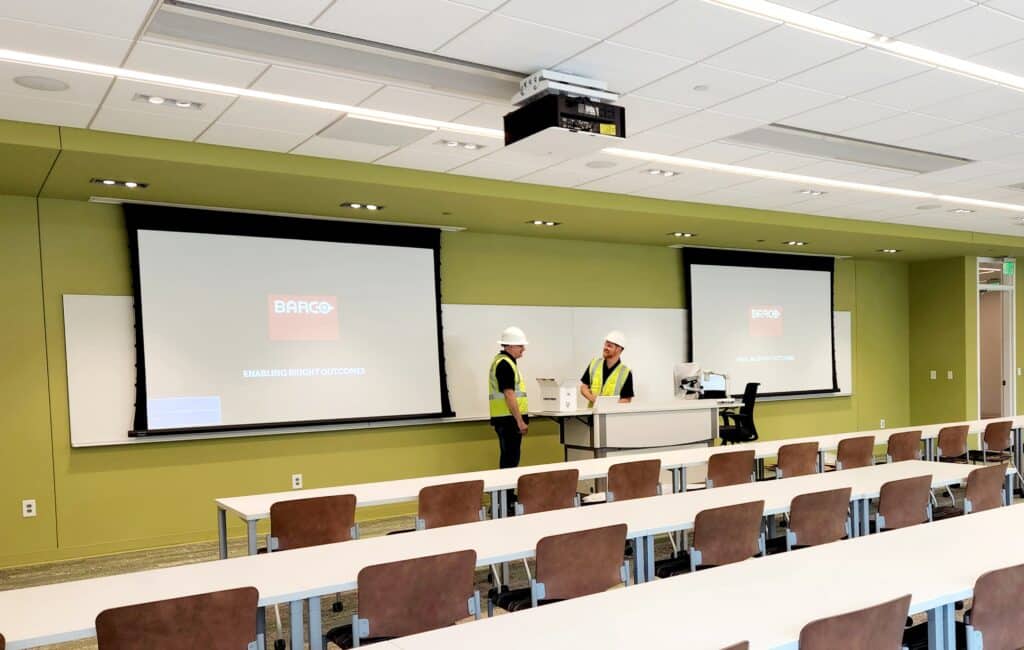
Today NetPlanner provides complete design services, installation and ongoing maintenance of all communication systems in commercial buildings, focusing primarily on hardware. The company also runs a network services division that offers help desk support for small businesses without their own IT departments.
“That’s what really caused NetPlanner to be formed in 1987 — the desire to be in a service business and to provide a service that was still working with the same sorts of clientele in the computer marketplace,” he said.
NetPlanner works with a variety of commercial enterprises, as well as K-12 schools, colleges, universities and large hospital systems.
“Everything that wasn’t on the IP network in a commercial building before 1990 started to fall onto the IP network,” said Bridges. “Things that we never anticipated, including telephone systems, which were totally separate back in the 1980s, now all operate over IP-based systems.”
In addition, things like security and access control, video surveillance and similar systems all work on IP networks.
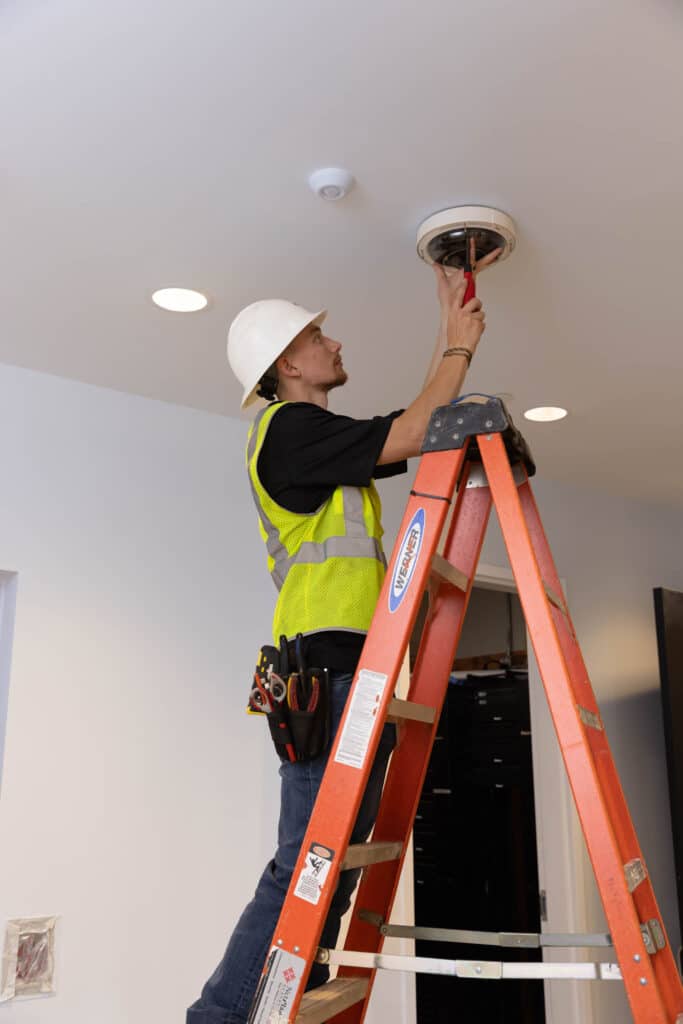
“So as time has gone on, NetPlanner has received requests from our customers to install these other systems, and we’ve embraced the other technologies that are now a part of almost all commercial buildings,” he added.
The company is now expanding its services to include nurse call services for hospitals — one of the newer markets for NetPlanner.
Security and access control systems
With ever-changing business technology needs, NetPlanner successfully keeps current with trends. With heightened security concerns everywhere, the company installs biometric readers and smart camera systems for access control.
“We provide a wide variety of smart camera systems, where they can do recognition, license plate recognition, facial recognition — all those kinds of intelligent systems for commercial spaces,” he said.
Building relationships with a wide variety of manufacturers who provide different types of software systems is how NetPlanner meets the needs of its clients.
“We work with whatever software system the particular enterprise feels is most appropriate for their needs, depending on whether they want to do license plate recognition or face recognition,” said Bridges. “We do a tremendous amount of security camera work in schools all over the southeast. And that is becoming more top of mind in school systems now.”
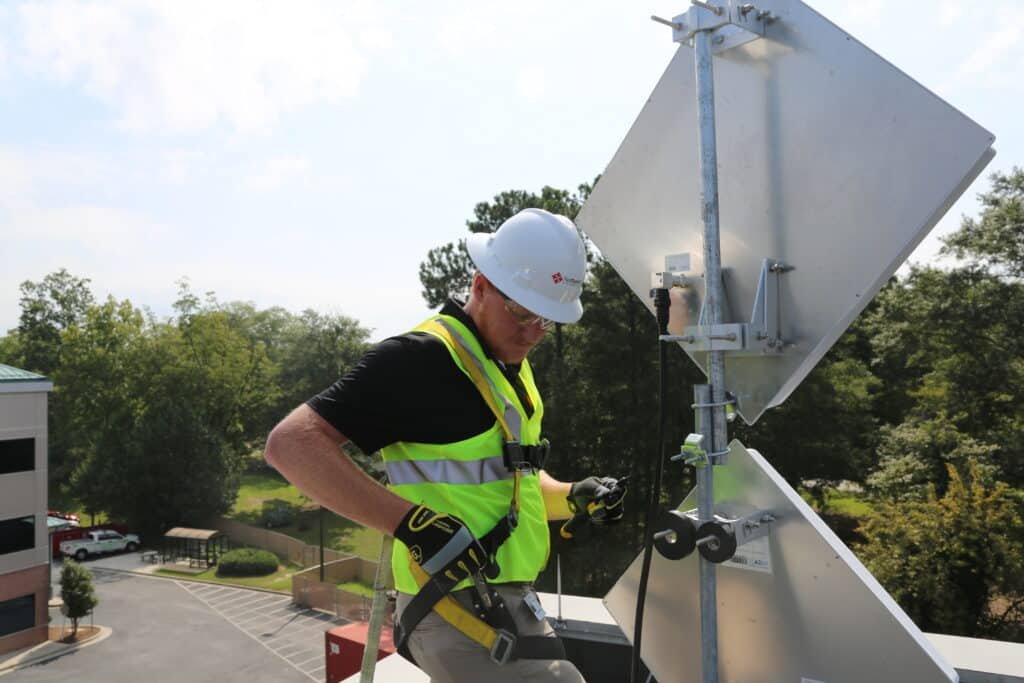
But there’s more. NetPlanner also provides distributed antenna systems (DAS) to improve cell phone coverage in commercial spaces.
“Cell carriers are concerned about not just signal strength, but also channel capacity — the ability to have a much larger number of users that might be around a particular cell tower at any given point in time,” said Bridges.
When installing a DAS, NetPlanner’s proficiency in coordinating with the carriers ensures compliance with carrier requirements and optimizes signal strength and coverage throughout the building.
Evolution of the technology-driven company
Anyone who knows Clint Bridges shouldn’t be surprised that he’s right in the thick of the technology boom. He started his first company at 19 and attended Southern Tech for a while before focusing on entrepreneurship.
“My passion for technology goes back to my earliest years. I’ve been fascinated by electronics and computers since I was very young. And I always had a home laboratory in the basement of the house as I was growing up,” he said. “I knew when I was in high school that I wanted to be an entrepreneur. During my time at Southern Tech, I started my first company and realized that’s what I wanted to do more than be at Southern Tech.”
NetPlanner is not only a local company. It operates fully-staffed branch offices in Augusta, Columbus and Savannah, as well as in Nashville, Tennessee; Raleigh, North Carolina; and Tampa, Florida. It has also provided services in every U.S. state, as well as parts of the Caribbean, Canada, London and Puerto Rico.
“We do projects all over the country, including some that are for companies that need to do national rollouts,” Bridges said. “A lot of our customers want to see the exact same approach used consistently throughout all their facilities across the country. So they’ll look to a company like NetPlanner to go and provide that consistent installation of all their communications technology needs in all their facilities across the country.”
Community commitment
Whether it’s working with manufacturing facilities and distributors, some of the largest big box organizations in the country, small retail businesses or anything in between, NetPlanner never loses sight of the local community.
With a home base in Peachtree Corners, the company has strong community involvement — including adopting a roadway section for clean-up efforts and participating in local chamber of commerce activities. NetPlanner has been active in several community events, such as shoe drives, food drives and charity walks, demonstrating its commitment to giving back.
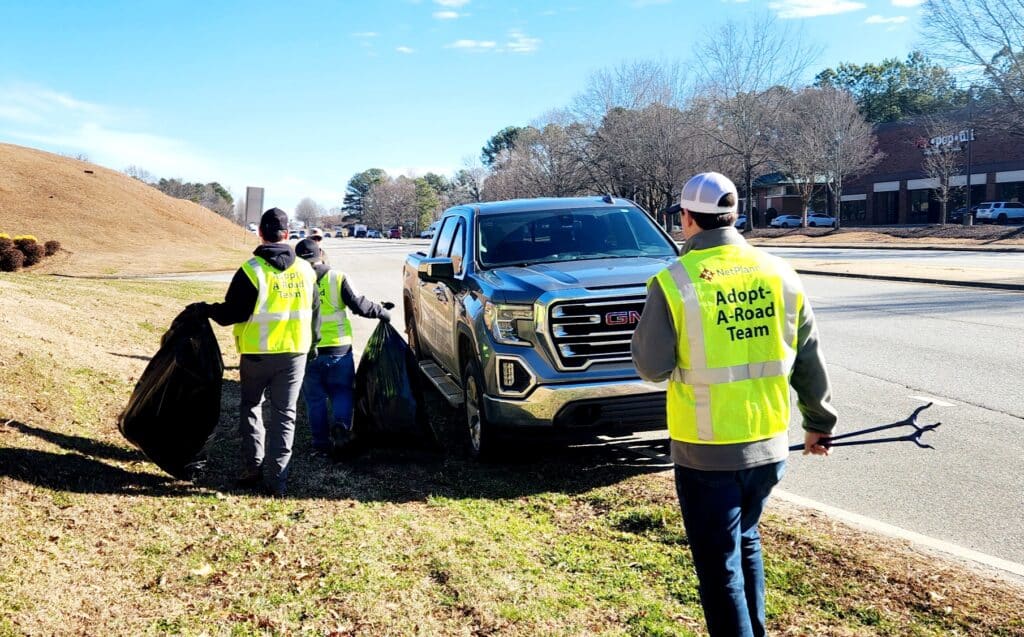
“Since 2018, we’ve adopted a roadway section in the community through Gwinnett Clean and Beautiful,” said Michelle Bruck, marketing specialist at NetPlanner. “We go out about five times a year, clear debris off of that roadway and just make sure that it’s beautiful and that it’s safer for people who are walking or driving in the area.”
Nationally, NetPlanner participates in Toys for Tots and Walk to End Alzheimer’s.
“Not only [do we give back] in our headquarters location, but all of our branch offices look for ways to help, get involved and support our communities that we’re part of,” Bruck added.
NetPlanner’s marketing efforts include social media, direct marketing and trade shows, with support from Vox-Pop-Uli for branded materials and printed media.
“When we first started using Vox-Pop-Uli, we had just a straightforward vendor relationship, but they very quickly became a partner to us,” said Bridges. “Vox-Pop-Uli has actually set up a company store on our behalf where our employees can purchase branded material, branded clothing, ball caps and those sorts of things. And they also handle printed media — things that we would use at trade shows.”
Looking forward
With technology moving at a warp speed, NetPlanner relies on a lot of repeat business.
“Bandwidth requirements are increasing year after year,” Bridges said. “Fiber optic cabling that we might have installed 10 years ago won’t support the data rates that are needed today, so it needs to be changed out in many cases.”
Many of the customers that he’s been with for several decades use NetPlanner’s services over and over.
“We’ve gone into the same building and re-cabled it over and over again as the different category levels of copper cabling have advanced,” he said. “The demands on fiber are now way beyond what they were even five years ago because the capacity has increased so much.”
And as everyone is embracing artificial intelligence, Bridges said he’s working to keep up.

“Everyone is well aware of what’s happening in the artificial intelligence space. And what’s really amazing to us is the number of new data centers that are being built across the United States by all the major players,” he said. “It’s kind of hard to imagine even being able to keep up with all that. We do a lot of data center work ourselves, and are trying to engage with more of our customers to help build some of these newer data centers.”
He added that the artificial intelligence boom is causing so much additional strain on the network infrastructure across the country, there are concerns about how it’s all going to be powered.
“I think everyone’s concerned,” he said. “Everyone that’s involved in this is wondering how we’re going to meet the bandwidth demands, the capacity demands, the power demands to make all this work.”
Staying ahead of the curve
With decades of experience, Bridges offers advice for all types of businesses starting out — put technology needs into your business model early on.
“The companies that struggle the most with technology are the ones that wait until after everything with the building is developed and completely built before they realize that they need Wi-Fi or some other network installation done,” he said. “It’s just a much more efficient process if we’re involved as early as possible to help design the network, along with the building structure itself.”
He also emphasized the importance of staying ahead of technological advancements to avoid falling behind.
“As fast as technology moves, if you get behind the power curve, it’s really hard to catch up,” he added.
The Local Thread: This business profile series is proudly supported by Vox-Pop-Uli, championing local stories and the communities we serve.
Related
Read the Digital Edition
Subscribe
Keep Up With Peachtree Corners News
Join our mailing list to receive the latest news and updates from our team.
You have Successfully Subscribed!

Guardians of the Jukebox to Play the VoxStage on May 31

“Geek Culture” Shines at 2025 MomoCon

Brandon Branham Honored for Transformative Leadership in Peachtree Corners

Music Matters Productions Expands Peachtree Corners Headquarters

Celebration and Community: ICAGeorgia Wraps Up School Year with Two Festive Events

Vox-Pop-Uli Launches RED Initiative for Veterans’ Support

The PCBA Awards $500 to Light Up The Corners at After-Hours Event

City Collaborates with DNR for Deer Overpopulation Solutions

City Collaborates with DNR for Deer Overpopulation Solutions

Peachtree Corners Festival Awards Debbie Mason Drama Scholarship for 2025

Vox-Pop-Uli Launches RED Initiative for Veterans’ Support

The PCBA Awards $500 to Light Up The Corners at After-Hours Event

“Geek Culture” Shines at 2025 MomoCon

Celebration and Community: ICAGeorgia Wraps Up School Year with Two Festive Events

Guardians of the Jukebox to Play the VoxStage on May 31

Music Matters Productions Expands Peachtree Corners Headquarters

Light up the Corners [Video]

Capitalist Sage: Business Leadership in Your Community [Podcast]

Cliff Bramble: A Culinary Adventure through Italy

Top 10 Brunch Places in Gwinnett County

A Hunger for Hospitality

THE CORNERS EPISODE 3 – BLAXICAN PART 1

Top 10 Indoor Things To Do This Winter

The ED Hour: What it takes to Remove Barriers from Education









